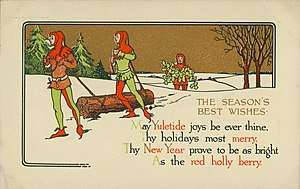Yuletide
See also: yuletide
English
WOTD – 25 December 2017
Etymology

A c. 1912 Yuletide and New Year card, from the collection of the Missouri History Museum in St. Louis, Missouri, USA
From Yule (from Middle English yole, from Old English ġeōl, ġeōla (“Christmastide, midwinter”), either cognate with[1] or from Old Norse jól (“midwinter season, yule”),[2] from Proto-Germanic *jehwlą (“celebration, festivity; yule”), perhaps from Proto-Indo-European *yekə- (“joke, play”)) + -tide (“period around a holiday”) (from Old English tīd (“period, season, time; feast-day, festal-tide”), ultimately from Proto-Indo-European *dī- (“time”)).
Pronunciation
- (Received Pronunciation) IPA(key): /ˈjuːlˌtaɪd/
- (General American) IPA(key): /ˈjulˌtaɪd/
Audio (AU) (file) - Hyphenation: Yule‧tide
Noun
Yuletide (countable and uncountable, plural Yuletides)
- (dated) The period of celebration of a pre-Christian festival associated with the (northern) winter solstice, later absorbed into the festival of Christmas.
- 1902 October, Henry van Dyke [Jr.], “The First Christmas-tree”, in The Blue Flower, New York, N.Y.: Charles Scribner's Sons, OCLC 1001566549, section II, page 277:
- For this is the Yuletide, and the heathen people of the forest are gathered at the thunder-oak of Geismar to worship their god, Thor.
- 1923 October, H[oward] P[hillips] Lovecraft, “The Festival”, in Weird Tales, volume 5, number 1, Indianapolis, Ind.: Popular Fiction Pub. Co., published January 1925; reprinted in Lin Carter, editor, The Doom that Came to Sarnath, New York, N.Y.: Del Rey Books, Ballantine Books, February 1971 (May 1991 printing), →ISBN, page 95:
- It was the Yuletide, that men call Christmas though they know in their hearts it is older than Bethlehem and Babylon, older than Memphis and mankind. It was the Yuletide, and I had come at last to the ancient sea town where my people had dwelt and kept festival in the elder time when festival was forbidden; where also they had commanded their sons to keep festival once every century, that the memory of primal secrets might not be forgotten.
-
- (dated) The period around Christmas; the Christmas season, Christmastime; specifically, Christmas itself.
- 1862, modified from Thomas Oliphant's original, “Deck the Halls”, in Jerry Snyder’s Easy Chord Christmas Guitar Book, Miami Beach, Fla.: Hansen House, published [19—?], OCLC 6529065, page 17:
- Deck the halls with boughs of holly, / Fa la la la la la la la la! / 'Tis the season to be jolly, / Fa la la la la la la la la! / Don we now our gay apparel, / Fa la la la la la la la la! / Troll the ancient yuletide carol, / Fa la la la la la la la la!
- 1922 February, James Joyce, “[Episode 17: Ithaca]”, in Ulysses, Paris: Shakespeare & Co.; Sylvia Beach, OCLC 560090630; republished London: Published for the Egoist Press, London by John Rodker, Paris, October 1922, OCLC 2297483, page 673:
- What did the first locked drawer contain? […] a Yuletide card, bearing on it a pictorial representation of a parasitic plant, the legend Mizpah, the date Xmas 1892, the name of the senders: from Mr and Mrs M. Comerford, the versicle: May this Yuletide bring to thee, Joy and peace and welcome glee: […]
-
- (Australia, regional) The period of southern winter in the middle of the year, sometimes celebrated in the colder, snowy regions of Australia with allusions to Christmas, which originated as a marketing gimmick.
- 2010, Lee Atkinson; Ron Crittall; Marc Llewellyn; Lee Mylne, “New South Wales”, in Emil J. Ross, editor, Frommer’s Australia 2010, Hoboken, N.J.: Wiley Publishing, →ISBN, page 186:
- Note that the colder winter months (June–Aug) are the busiest season. This period is known as Yuletide—the locals' version of the Christmas period, when most places offer traditional Christmas dinners and roaring log fires.
-
Synonyms
- (Christmas season): Christmastide (one sense)
Translations
period of celebration of a pre-Christian festival associated with the (northern) winter solstice
|
period around Christmas — see Christmastide
References
- “yule” in Dictionary.com Unabridged, Dictionary.com, LLC, 1995–present; “yule” in Merriam–Webster Online Dictionary; “Yule” (US) / “Yule” (UK) in Oxford Dictionaries, Oxford University Press.
- “yule” in Douglas Harper, Online Etymology Dictionary, 2001–2019.
This article is issued from
Wiktionary.
The text is licensed under Creative
Commons - Attribution - Sharealike.
Additional terms may apply for the media files.